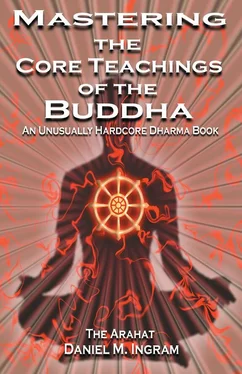Daniel Ingram - Mastering the Core Teachings of Buddha - An Unusually Hardcore Dharma Book
Здесь есть возможность читать онлайн «Daniel Ingram - Mastering the Core Teachings of Buddha - An Unusually Hardcore Dharma Book» весь текст электронной книги совершенно бесплатно (целиком полную версию без сокращений). В некоторых случаях можно слушать аудио, скачать через торрент в формате fb2 и присутствует краткое содержание. Год выпуска: 2009, ISBN: 2009, Издательство: Aeon Books, Жанр: Старинная литература, на русском языке. Описание произведения, (предисловие) а так же отзывы посетителей доступны на портале библиотеки ЛибКат.
- Название:Mastering the Core Teachings of Buddha - An Unusually Hardcore Dharma Book
- Автор:
- Издательство:Aeon Books
- Жанр:
- Год:2009
- ISBN:9781904658405
- Рейтинг книги:5 / 5. Голосов: 1
-
Избранное:Добавить в избранное
- Отзывы:
-
Ваша оценка:
- 100
- 1
- 2
- 3
- 4
- 5
Mastering the Core Teachings of Buddha - An Unusually Hardcore Dharma Book: краткое содержание, описание и аннотация
Предлагаем к чтению аннотацию, описание, краткое содержание или предисловие (зависит от того, что написал сам автор книги «Mastering the Core Teachings of Buddha - An Unusually Hardcore Dharma Book»). Если вы не нашли необходимую информацию о книге — напишите в комментариях, мы постараемся отыскать её.
Mastering the Core Teachings of Buddha - An Unusually Hardcore Dharma Book — читать онлайн бесплатно полную книгу (весь текст) целиком
Ниже представлен текст книги, разбитый по страницам. Система сохранения места последней прочитанной страницы, позволяет с удобством читать онлайн бесплатно книгу «Mastering the Core Teachings of Buddha - An Unusually Hardcore Dharma Book», без необходимости каждый раз заново искать на чём Вы остановились. Поставьте закладку, и сможете в любой момент перейти на страницу, на которой закончили чтение.
Интервал:
Закладка:
shows (Kung Fu comes to mind), movies, legends, 60’s gurus, popular music, popular magazines, and other aspects of popular culture in general. More formal and traditional sources include the ancient texts and traditions of Buddhism, Hinduism, Taoism, Sufism, Kabbala (however you spell it), Christianity, Western Mystical Traditions (Alchemy, Theosophy, Golden Dawn related traditions, etc.), the ancient Greek mystery schools (including the fragmentary writings of those like Heraclites), and the non-aligned or ambiguously aligned teachers such as Kabir, Khalil Gibran, J. Krishnamurti, and many others.
263
Models of the Stages of Enlightenment
Modern fusion traditions, such as the various new versions of Buddhism and other traditions that are present in the West, also have a wide range of explicit and implied ideals about awakening. Plenty of people also seem to take their own inborn higher ideals for themselves or others that have arisen from sources hard to define and made these a part of their working if usually poorly-defined models of enlightenment.
There is also a strong tradition in the West of believing that enlightenment involves perfecting ourselves in some psychological sense, though this is also prominent in certain Eastern and traditional models as well in slightly different forms.
Just about all of these sources contain some aspects that may at times be useful and other aspects that at times may be useless or even send people in the wrong direction. The number of contradictions that can be found even within each specific tradition on the subject is much larger than I think most people imagine. For instance, those who attempt a systematic review of the dogmas of enlightenment within the Pali Canon will find themselves tangled in a mass of widely divergent doctrines, myths, stories and ideals, and this is only one tradition.
Thus, to take on the subject of the models of the stages of
enlightenment is a daunting task, but by breaking it down into simplified categories, some discussion of this wide mass of dogma and half-truth is possible. I will use both simple, broadly applicable models and also discuss specific models that come from some of the traditions and try to relate these to reality. In the end, relating them to reality is essentially the practice, and that falls to you.
I consider this attempt to be just one addition to an old tradition that attempts to reform the dogma and bring it back in line with verifiable truths, albeit one that is more specific and comprehensive than any that I have found. Each new culture, place, time and situation seems to need to do this again and again, as the forces within us and society that work to promote models that are out of touch with the truth of things are powerful and perennial, with money, power, fame, ideals of endless bliss and pleasure, the enticing power of the ideals of self-perfection and the pernicious inertia of tradition being chief among them.
In that same vein, this chapter is very much a situation in which I claim a very high level of realization, write as if what I have achieved is 264
Models of the Stages of Enlightenment sufficient authority to write a chapter such as this one, and then present it as if this is a definitive text on the subject, sufficient to contradict significant portions of 2,500 years of tradition and the teachings and writings of countless previous and current commentators. While it is hard from my current vantage point to not believe this to be true, anyone with sense will read this chapter with appropriate skepticism, and this, as I see it, is one of the strengths of properly applied Buddhism and rational thought in general. The Buddha was forever asking people to not take his word at face value, but instead to do the experiment and see if they come to the same conclusions. I recommend the same. If you are able to achieve something beyond what I state is possible, more power to you, and please let me know how you did it! I would feel real regret if I thought that this work had hindered anyone from achieving their full human potential, and am always looking for practices and concepts that are useful.
Here is a list of the basic categories of models that I use, though most traditions contain a mix of most or all of these. There are probably other aspects of the dreams of enlightenment that I have failed to address, but this list should cover most of the basic ones. I look at each of these as representing some axis of development, and basically all of them are good axes to work on regardless of what they have to do with enlightenment. That said, from what I have already written, it will not be hard to pick out my favorites:
1. Non-Duality Models: those models having to do with eliminating or seeing through the sense that there is a fundamentally separate or continuous center-point, agent, watcher, doer, perceiver, subject, observer or similar entity.
2. Fundamental Perceptual Models: those that have to do with directly perceiving fundamental aspects of things as they are, including perceiving emptiness, luminosity, impermanence, suffering, and other essential aspects of sensations regardless of what those sensations are.
3. Specific Perceptual Models: those that involve being able to perceive more and more, or all, of the specific sensations that make up experience with greater and greater clarity at most or all times, and usually involve perfected, continuous, panoramic mindfulness or concentration at extremely high speed.
265
Models of the Stages of Enlightenment
4. Emotional Models: those that have to do with perfecting or limiting the emotional range, usually involving eliminating things like desire, greed, hatred, confusion, delusion, and the like.
5. Action Models: those that have to do with perfecting or limiting the things we can and can’t do in the ordinary sense, usually relating to always following some specific code of morality or performing altruistic actions, or that everything we say or do will be the exactly right thing to have done in that situation.
6. Powers Models: those that have to do with gaining in abilities, either ordinary or extraordinary (psychic powers).
7. Energetic Models: those that have to do with having all the energy (Chi, Qi, Prana, etc.) flowing through all the energy channels in the proper way, all the Chakras spinning in the proper direction, perfecting our aura, etc.
8. Specific Knowledge Models: those that have to do with gaining conceptual knowledge of facts and details about the specifics of reality, as contrasted with the models that deal with perceiving fundamental aspects of reality.
9. Psychological Models: those that have to do with becoming psychologically perfected or eliminating psychological issues and problems, i.e. having no “stuff” do deal with, no neuroses, no mental illnesses, perfect personalities, etc.
10. Thought Models: those that have to do with either limiting what thoughts can be thought, enhancing what thoughts can be thought, or involve stopping the process of thinking entirely.
11. God Models: those that involve perceiving or becoming one with God, or even becoming a God yourself.
12. Physical Models: those that involve having or acquiring a perfected, hyper-healthy or excellent physical body, such as having long earlobes, beautiful eyes, a yoga-butt, or super-fast fists of steel.
13. Radiance Models: those that involve having a presence that is remarkable in some way, such as being charismatic or radiating love, wisdom or even light.
14. Karma Models: those that involve being free of the laws of reality or causes that make bad things to happen to people, and thus living a blessed, protected, lucky, or disaster and illness-free life.
266
Models of the Stages of Enlightenment 15. Perpetual Bliss Models: those models that say that enlightenment involves a continuous state of happiness, bliss or joy, the corollary of this being a state that is perpetually free from suffering. Related to this are models that involve a perpetual state of jhanic or meditative absorption.
Читать дальшеИнтервал:
Закладка:
Похожие книги на «Mastering the Core Teachings of Buddha - An Unusually Hardcore Dharma Book»
Представляем Вашему вниманию похожие книги на «Mastering the Core Teachings of Buddha - An Unusually Hardcore Dharma Book» списком для выбора. Мы отобрали схожую по названию и смыслу литературу в надежде предоставить читателям больше вариантов отыскать новые, интересные, ещё непрочитанные произведения.
Обсуждение, отзывы о книге «Mastering the Core Teachings of Buddha - An Unusually Hardcore Dharma Book» и просто собственные мнения читателей. Оставьте ваши комментарии, напишите, что Вы думаете о произведении, его смысле или главных героях. Укажите что конкретно понравилось, а что нет, и почему Вы так считаете.












